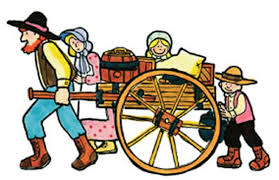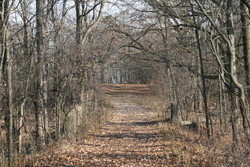
As I took a seat in the west bound B&O limited, old gentleman, who with his aged partner, occupied the seat immediately behind me, reached forward and asked, "Is this Fort Defiance?" I nodded an affirmative. He smiled, saying, "There's a right smart of change in this village to what she was in 29 and 30, aint they, mother?" and turned to the old lady behind him. "I should reckon there is, Silas. Lets see how many years is it since we left this section; 65 years this coming May, Silas, we yoked up the old ox team and started for Illinoy. "Did you live in Defiance, I asked?" "No, we never lived in this village, though we did most of our trading there and mother, here, would walk to town once or twice a year during the good goin in the summer."
When did you come to Defiance county? I asked. "I never came to Defiance county, young man. There was no such county around here, and I have been away so long I cannot recall the name, but I think it was Williams, wasn't it mother?" I can't recollect, I am sure, but something like that," she replied. As the train pulled out from the station the old gentleman's eyes were anxiously taking in the surrounding country, while he kept a rapid conversation with his wife and as we crossed the river at the Bend he asked, "what river is this?" It is the Maumee river, said I. "Why, said he, I thought we cross that stream back at the village of Fort Defiance." I told him that was the Auglaize, and this stream at this point is some seven miles west of Defiance. "well I declare, what do you think mother, we must be some where mighty near Newburg." "I wonder how that town looks now. If she has grown anything like Fort Defiance she is quite a town now." Newburg, said I, there is no such place in this county. "Oh yes there is young man, said the old lady, we were living on our clearing at the Montgomery Evans surveyed off the plat. A man by the name of Arrowsmith was the surveyor. "I remember well the days they spent there and how undecided they were as to forty would be the best. I cooked for the men and I shall never forget, how surprised Mr. Evans was at our fine (as he called it) meats, our coffee made from the burnt crust of johnny cakes, our home made horminy, in fact all our food was home made those days, spoke up the old gentleman.
"Do you remember the evening the men finished the survey, mother, how Evans and me got pretty jolly over several noggins of your home-made ale? and he broke his Jacob's staff helping me roll in a fresh back-log for the fire."
The old lady nodded a smiling recollection and said, "yes I remember more that took place that evening, and I can hardly forget how sick you were the next day.
Do you remember the old wooden bowl, the only one we had? He broke it trying to spin it on the point of his Jacob's staff." The old gentleman chuckled, and seemed to enjoy there pleasant reminiscences.
I handed the old gentleman my card and he with a pleasant smile; "I have no card with my name wrote onto them," but I can tell it to you; "My name is Silas P Gregg, and I was born in Maryland, on the 22nd day of August, 1799. My father's name was Joshua J Gregg, and my mother's name was Janet Wolff." "I should very much like to hear some of your early experiences," said I, "and if you ever smoke, let us go forward to the smoking car." "If he ever smokes" said the old lady. "I don't know when I have seem him without his pipe for so long a time as since we got aboard the keers." I don't see you standing it, Silas? "We'll, you mother, I ain't used to these new fangled ways of doing things, and I was afraid to fill up my pipe for fear of getting into trouble and besides I found plenty to draw my attention looking out the window but if the young man has a extra, segar I don't mind if I do go along with him to the smoking car for a while."
As we got up to go forward the old lady cautioned him, "to be very keerful about walkin over the platforms of the keers and don't fall off fer mercy sakes, for if you do, hurt, yourself and ruin your clothes just as likely as not." "Now do be very keerful."
When we got seated and the old gentleman had his segar well lighted he said, "N ow you want to hear something of my early life. Well when my father moved from Maryland he came with a party of five other families to Northampton county, Pa., and remained there until his death. At his death I was 12 years old. There were four boys and seven girls of us and mother was soon discouraged and in a less than two years she followed father. After her death the family was divided, some of us began shifting for ourselves and several of us were kindly taken in to some of the neighboring families. I made my home with a family by the name of Flood. I lived with them until the fall of 14, when a party of young men forming to move west and I joined them.
"We landed in Detroit in the spring of 15, and I remained there for several years. I was quite a hunter in those days and made considerable money trapping and hunting. A man by the name of Sam Stockbridge and me worked together the winter and spring of 16 and 17, and our pelts brought us over $700, which we divided, and that summer I branched out for myself. In the fall I returned to near Detroit and met my wife. Her father was a sailor. He owned and run a small vessel between Detroit and Buffalo, and I made several trips with him in the summer of 1820, but, I never could get used to the water and in the fall of 1820 I married his daughter Mary. We lived in Detroit until the following summer, when another family, we concluded to settle in the Maumee Valley, but just where we did not know, and after some little time we finally located at Waterville. I kept a sort of store and tavern there for several years. Two children, were born to us there but both took the milk sickness and in 27, and shortly after I moved from there to Ft Wayne, which at that time was not much of a place, yet it had a very nice brick school house, church and public house all in one. In the spring of 29, I put all my provisions aboard a pirogue and started for Waterville, in tending to settle there for good, but as we floated down the river, one of our children took sick, and we tied up at or near where Newburg (Defiance county) was afterwards laid out. I never saw such rich bottom lands as were opposite the site of that town, and in those days there was quite a little Indian village on these bottoms. We were kindly taken care of there and when our child was well enough to travel, the water was so low our boat could not float over the riffles, so we concluded to remain and try our luck there. I bought sixty acres of land from the Evans boys and began chopping off a spot for our cabin. We were given every encouragement by the few white people of the neighborhood, and in a short time we became reconciled and I believe we were really happy. A White man by the of Moses Taylor, was our nearest neighbor and he lived about three miles up the river from our place. There were several white families in the neighborhood, and across the river from our home was the camp of a small band of Moravian christian Indians. My wife could not stand the tricks of the Potawatamie and other other roving bands of Indians, and in the spring of 35 we again pulled up and emigrated to Illinois, where we now live.
What induced us to go in the spring was the deviltry of the band of Potawatamie, who were up to all sorts of tricks and meanness, and would take possession of remote settlers cabin, and compel his wife to cook for them, turn the family out of doors, sleep in their beds and if they saw anything they wanted would appropriate it and marching off, leave the settler and his family in many instances, entirely destitute.
The thing that precipitated our moving was the assault made on the wife of a neighbor Hanna who lived on the bottoms about four miles up the river from Newburg. The women Mrs. Hanna and her daughter a young lady of about 18 years, were in the field working and a band of drunken Indians coming up, them, and drove them to the house which they didn't reach in time to bar the door, and the devils throwing themselves against it burst it open and attempted to enter but were met by Mrs. Hanna who kept them out by standing in the door and swinging an ax before their faces. One of them fired a shot and struck her hand but she got even by striking one of them a blow on the head which fell him to the ground. By this time her daughter came to her aid and while the devils were looking after their injured pardner the two women succeeded in barring the door and managed by a careful and closed watch to keep them away until the continued firing of their guns brought some hunters and neighbors to their rescue. The Indians fled on the approach of the neighbors, (all but two who were so badly wounded they could not,) and were pretty roughly handled by the boys. Two were killed, and one or two were wounded. The two who were unable to get away were finished by Mr. Hanna on his return home in the evening.
Such occurrences were quite common in those days, The people seemed to care but little, and soon the circumstance would pass from mind and the solitary and monotonous life of the pioneer continue only now and then to be interrupted by a similar outbreak of some band of savages.
My wife couldn't stand it, and she declared she would start for Detroit on foot and alone if I would not go with her, so we moved again.
I do not remember the name of the early settlers there. It has been a long time you know;; let's see 57 years ago this spring we left. Oh, yes, I remember the Hilton's, they used to live west of Defiance on the river. But I guess mother will be anxious to see me; its kind of lonesome riding all lone you know and we have talked a good deal, I think I will go back to her for a while. If you are going far I may smoke another segar with you.




